What was once believed to be a camp for the Pyramid builders in Giza may have actually been barracks for the Pharoah’s military troops.
Archaeologists have discovered evidence of barracks close to an ancient port suggesting the settlement could have been home to soldiers or sailors.
The findings call into question previous theories that thousands of workers would have set up camp in the region while building the pyramid of Giza.

Archaeologists have discovered evidence of what is believed to be ancient barracks, pictured, close to the site of a port near Giza in Egypt. The location of the barracks to this port suggests the settlement could have been home to soldiers or sailors
WHO WAS PHAROAH MENKAURE?
Menkaure was the son of Khafra and the grandson of Khufu.
He was born in 2530BC and reigned for approximately 22 years – although some reports put this figure higher.
He was part of the 4th dynasty and during his reign, Menkaure commissioned the final pyramid in Giza to be built.
It is known as the Pyramid of Menkaure or Netjer-er-Menkaur, which means ‘Menkaure is divine.’
A monument close to the site of the pyramid was built in honour of Queen Khentkawes, believed to be Menkaure’s daughter.
Menkaure was buried in this pyramid and a sarcophagus was excavated from the burial chamber in 1837 before being shipped to the British Museum in London.
Researchers from Ancient Egypt Research Associates (AERA) based in Massachusetts have been excavating the site, situated approximately 1,300ft south of the Great Sphinx of Giza, since 1988.
Last year, they discovered a large collection of animal bones, evidence of an ancient slaughter house for animals and a cemetery, thought to have been full of the bodies of pyramid workers.
The site is popularly known as the Lost City of Pyramid Builders, or Heit el-Ghurab and is believed to date back to the reign of pharaoh Menkaure at around 2550BC.
Menkaure was the son of Khafra and the grandson of Khufu and commissioned the final pyramid in Giza to be built, known as the Pyramid of Menkaure or Netjer-er-Menkaur, which means ‘Menkaure is divine.’
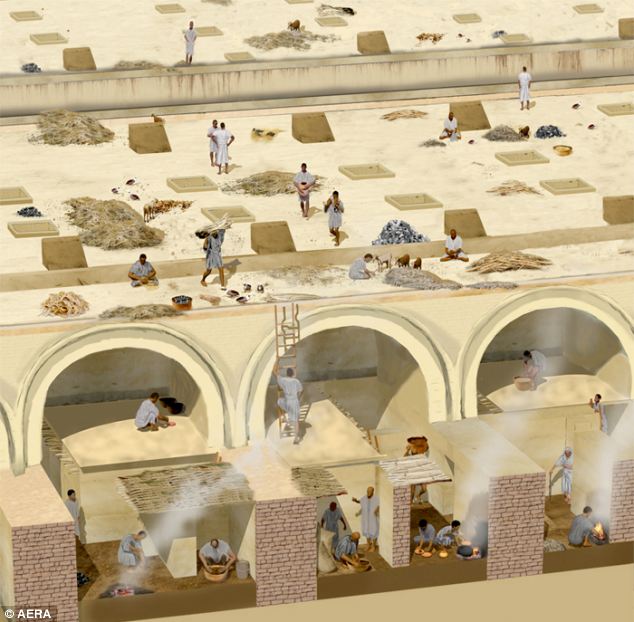
This reconstruction of the ancient barracks shows how troops lived and worked in the three-storey settlement. The total size of the site is said to cover almost ten football pitches. AERA believes the it would have been built in the 35 to 50 years that spanned the reigns of pharoahs Khafre and Menkaure
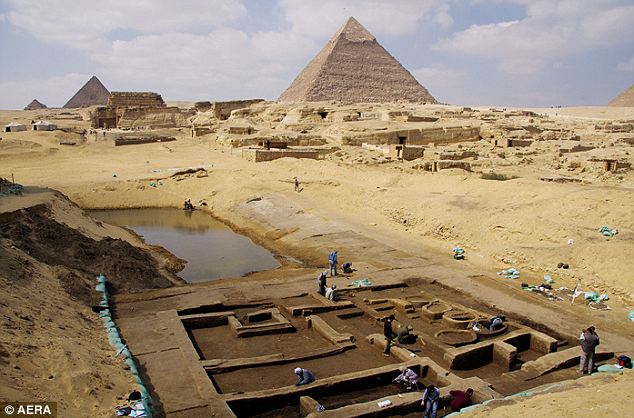
Excavtors also found a large basin, pictured, near the site of the barrackes, suggesting the area may have been a port. This was bolstered by the fact the basin was found approximately half a mile away from a channel of the River Nile
However, more recent findings near this site, close to a monument dedicated to what is said to be Menkaure’s daughter Queen Khentkawes, suggest the area may have been a port.
Excavators discovered a large basin that may have formed part of a harbour or waterfront. This was bolstered by the fact the basin was found approximately half a mile away from channel of the River Nile.
AERA director Mark Lehenr and his team also found charcoal remains of trees that came from the Levant, a region in the eastern Mediterranean, along with pottery and jars for the same location.
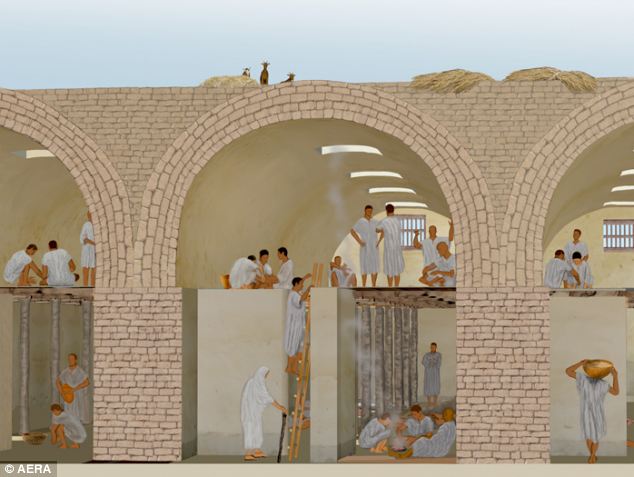
This reconstructions shows how the galleries may have looked. It is thought that sailors may have travelled to and from the barracks from the Levant. Researchers also found charcoal remains of trees, and pottery from the Levant region in the eastern Mediterranean
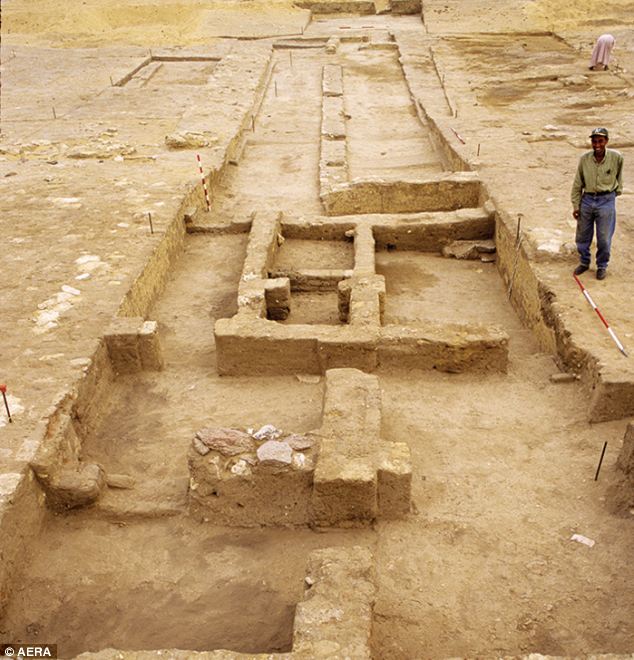
Elsewhere, on the site of the Lost City, the archaeologists found evidence of long buildings called galleries, pictured, that could have been used to house visitors to the port. The galleries would have been approximately 113ft long and 23ft tall
MYSTERY OF HOW THE PYRAMID WORKERS BUILT THE ANCIENT STRUCTURES
The site of the AERA dig is popularly known as the Lost City of the Pyramid Builders (pictured) because of its close proximity to the Giza pyramids.
Last year, researchers discovered a large collection of animal bones, evidence of an ancient slaughter house, and a cemetery, thought to have been full of the bodies of pyramid workers.
However, the latest findings suggest the site was used by sailors and troops, which has raised questions surrounding where the workers lived, and died.
In 2004, remains of builders were found in ancient dumps near the structures, but not evidence of buildings or a settlement were found.
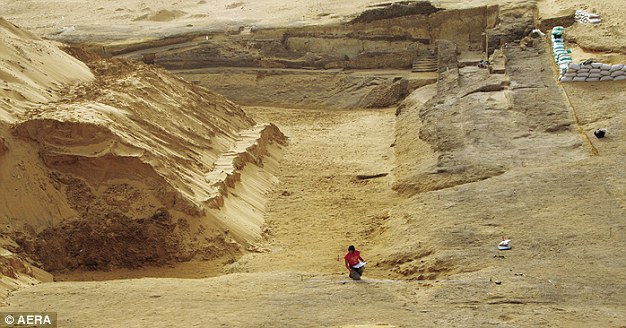
AERA’s director Michael Lerner told LiveScience he believes the builders slept on the ramps they are believed to have used to construct the vast landmarks.
For centuries it’s been thought that the ancient Egyptians built their huge pyramids by hauling heavy granite blocks up these specially crafted ramps.
Yet Newport engineer Peter James has branded this ‘impossible’, claiming the ramps would need to have been a quarter of a mile long or else they would have been too steep to carry the large blocks up.
He believes, instead, that the Egyptians built an inner core of zigzagging ramps, using smaller, lighter blocks while the larger outer casing stones were placed on the outside using scaffolding.
If this is true, this would cast doubt on Lehner’s claims about where the workers slept – once again raising the question about where they stayed.
Materials used to build the pyramids in the region could have been transported along the Nile to this port, and may have been distributed via the settlement harbour.
Elsewhere, on the site of the Lost City, the archaeologists found evidence of long building called galleries that could have been used to house visitors to the port.
It is thought that sailors may have travelled to and from the Levant, or troops used to guard the pharaoh and his family and friends.
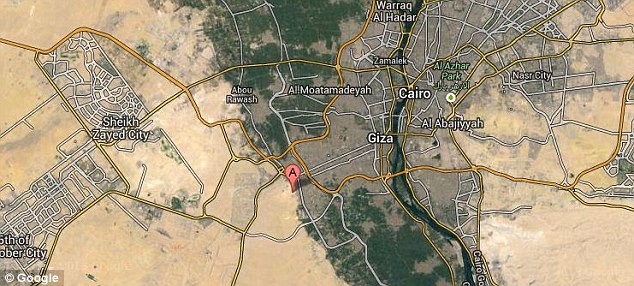
Researchers from Ancient Egypt Research Associates (AERA) based in Massachusetts have been excavating the site, marked at A, situated approximately 1,300ft south of the Great Sphinx of Giza, since 1988
The galleries would have been approximately 113ft long and 23ft tall.
In 2012, researchers found the hip of a hippo. A ritual in ancient Egypt among troops involved hunting and harpooning hippos, and the discovery of the hip adds weight to these claims troops occupied the area at some time.
The total size of the site is said to cover almost ten football pitches.
AERA believes the development of the urban complex would have been ‘quite rapid’, and happened in the 35 to 50 years that spanned the reigns of Khafre and Menkaure.

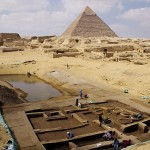






 Photographer Finds Locations Of 1960s Postcards To See How They Look Today, And The Difference Is Unbelievable
Photographer Finds Locations Of 1960s Postcards To See How They Look Today, And The Difference Is Unbelievable  Hij zet 3 IKEA kastjes tegen elkaar aan en maakt dit voor zijn vrouw…Wat een gaaf resultaat!!
Hij zet 3 IKEA kastjes tegen elkaar aan en maakt dit voor zijn vrouw…Wat een gaaf resultaat!!  Scientists Discover 512-Year-Old Shark, Which Would Be The Oldest Living Vertebrate On The Planet
Scientists Discover 512-Year-Old Shark, Which Would Be The Oldest Living Vertebrate On The Planet  Hus til salg er kun 22 kvadratmeter – men vent til du ser det indvendigt
Hus til salg er kun 22 kvadratmeter – men vent til du ser det indvendigt  Superknepet – så blir snuskiga ugnsformen som ny igen!
Superknepet – så blir snuskiga ugnsformen som ny igen!  Meteorite That Recently Fell in Somalia Turns Out to Contain Two Minerals Never Before Seen on Earth
Meteorite That Recently Fell in Somalia Turns Out to Contain Two Minerals Never Before Seen on Earth  Nearly Frozen Waves Captured On Camera By Nantucket Photographer
Nearly Frozen Waves Captured On Camera By Nantucket Photographer  It’s Official: Astronomers Have Discovered another Earth
It’s Official: Astronomers Have Discovered another Earth 